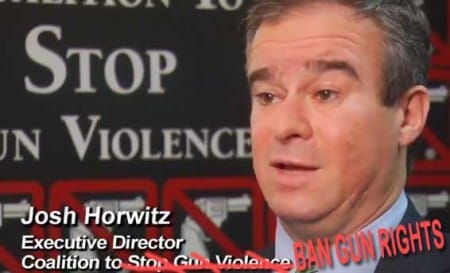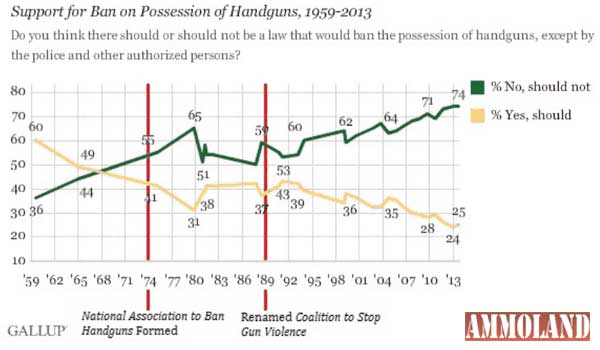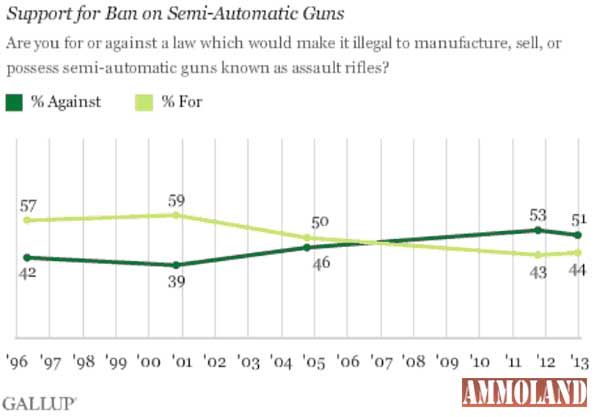By Max McGuire


New Jersey –-(Ammoland.com)- Gun-control groups rely on tragedies. They feed on it. Without tragedies like Columbine, Virginia Tech, and Newtown, gun-control advocates have no power.
Otherwise, gun violence would sit low on voters’ lists of important issues. One can’t blame groups like the Coalition to Stop Gun Violence (CSGV) and Moms Demand Action for Gunsense in America for taking advantage of these crises.
In the words of former White House Chief of Staff and current Mayor of Chicago Rahm Emanuel, “you never want a serious crisis to go to waste.”
There are also plenty of gun rights organizations that use developments as excuses to send out fundraising emails. The problem is that gun-control groups are so quick to jump on current events (often prematurely) that they fail to see the long-term trends of public opinion.
Sometimes, late at night, I get bored and decide to engage gun control groups on Twitter. Obviously, I am probably just arguing with the organizations’ social media interns, but nevertheless it is interesting to see how the conversations develop. On one particular day, CSGV promised that it was not trying to go after the average gun owner and I just had to respond.

CSGV’s assertion that gun rights supporters are fringe “extremists” is rather interesting given that organization’s history. While the Coalition to Stop Gun Violence may have a palatable name today, few people are aware that this hate group was formed under a different name.
In 1974, the United Methodist Church founded the National Association to Ban Handguns under the church’s core philosophy that it “does not believe there is any constitutional personal right to bear arms.” The Book of Resolution (BOR) of the United Methodist Church fully explained why the church was specifically targeting handguns:
“Special controls should be applied to the hand-gun, for it is the most deadly and least utilitarian weapon in American society. Because the handgun is concealable, it is a weapon of crime; because the handgun is available, it is the instrument used in suicides and crimes of passion.”
The United Methodist Church’s goal was to “establish a national ban on the importation, manufacture, sale, and possession of handguns and handgun ammunition with reasonable limited exceptions.” Anytime a gun control advocate calls a suggestion “reasonable,” it likely isn’t. If the church had its way, exemptions would apply to “police, military, licensed security guards, antique dealers who have guns in unfireable conditions, and licensed pistol clubs where firearms are kept on the premises under secure conditions.”

The above chart shows Gallup’s history of polling public opinion towards banning handguns, with CSGV’s history added for context.
The National Association to Ban Handguns represented a minority opinion when it was founded. CSGV may claim that the National Rifle Association is nothing but a dangerous, minority faction, but a quick look at history proves that CSGV has seldom, if ever, been on the right side of public opinion.
The National Association to Ban Handguns claimed that pistols were the “most deadly and least utilitarian” weapons in society. After fifteen years of failing to sway public opinion against handguns, the organization changed its name and widened its message to target so-called “assault weapons.” Today the same organization is telling the American people that semi-automatic rifles also have no lawful purpose ( https://csgv.org/issues/assault-weapon/) in today’s society and are only designed to kill as many people as possible. They claim that these rifles are the most dangerous weapons available to the public because of their large magazine capacity. It’s funny how they argued in the 1970s that handguns were the most dangerous weapons for the opposite reason (concealability).
Regardless of how dangerous handguns may be, the Supreme Court ruled in DC v. Heller (2008) that private ownership of a handgun, and of any other weapon “in common use,” is an individual right protected by the Constitution. Not surprisingly, the United Methodist Church amended the gun portion of its BOR in 2008, removing all questions of handgun constitutionality. This has forced CSGV to turn its attacks towards “assault weapons.”
But again, CSGV is on the wrong side of history and on the wrong side of public opinion.

The Sandy Hook school shooting, as horrific as it was, only shifted public opinion one or two percentage points. Even so, a sizable 51% of the American people still opposed a ban on semi-automatic rifles (for all you statistics wonks: that’s outside the poll’s margin of error).
My late-night Twitter conversation with CSGV showed something very interesting. When asked why the organization worked so hard to ban handguns, the reasoning was “because of how often they were being recovered from crime scenes.” This is a horrible reason to enact legislation, and I suspect that the same logic is behind the recent push to ban semi-auto rifles. Gun control advocates can claim as much as they want that handguns and semi-auto rifles aren’t utilitarian. They can continue to ignore that there are upwards of 4.5 million instances of defensive gun use (DGU) in the U.S. every year. They can also call the AR-15 a deadly “weapon of war,” even as the military considers replacing the “underpowered” M4 platform with a larger-caliber battle rifle.
But gun control groups like the Coalition to Stop Gun Violence cannot ignore that despite their best efforts, the majority of Americans continue to disagree with their organizations’ core tenets.
About SanityPolitic’ Max Mcguire;
Max McGuire is currently pursuing a Master’s Degree in Political Science at Villanova University. He graduated from Boston College, majoring in Political Science and minoring in Arabic Studies. Follow him on Twitter@SanityPolitics
